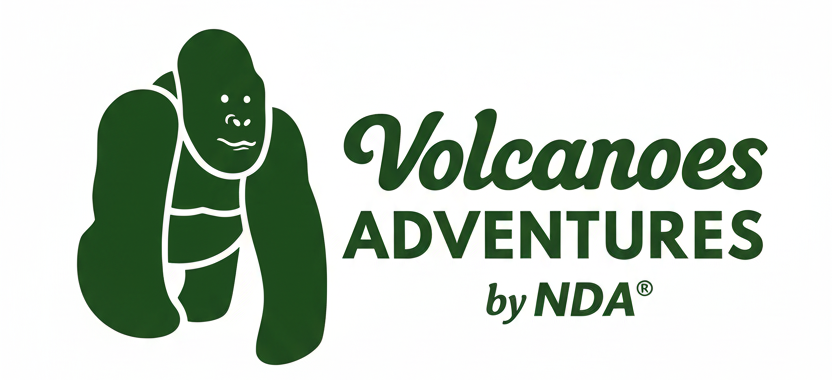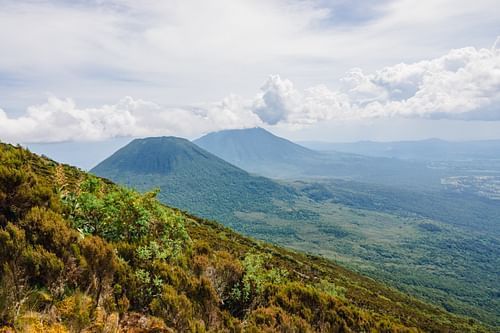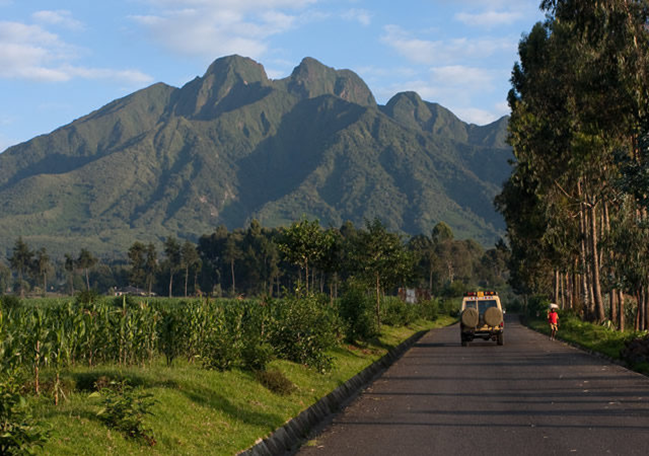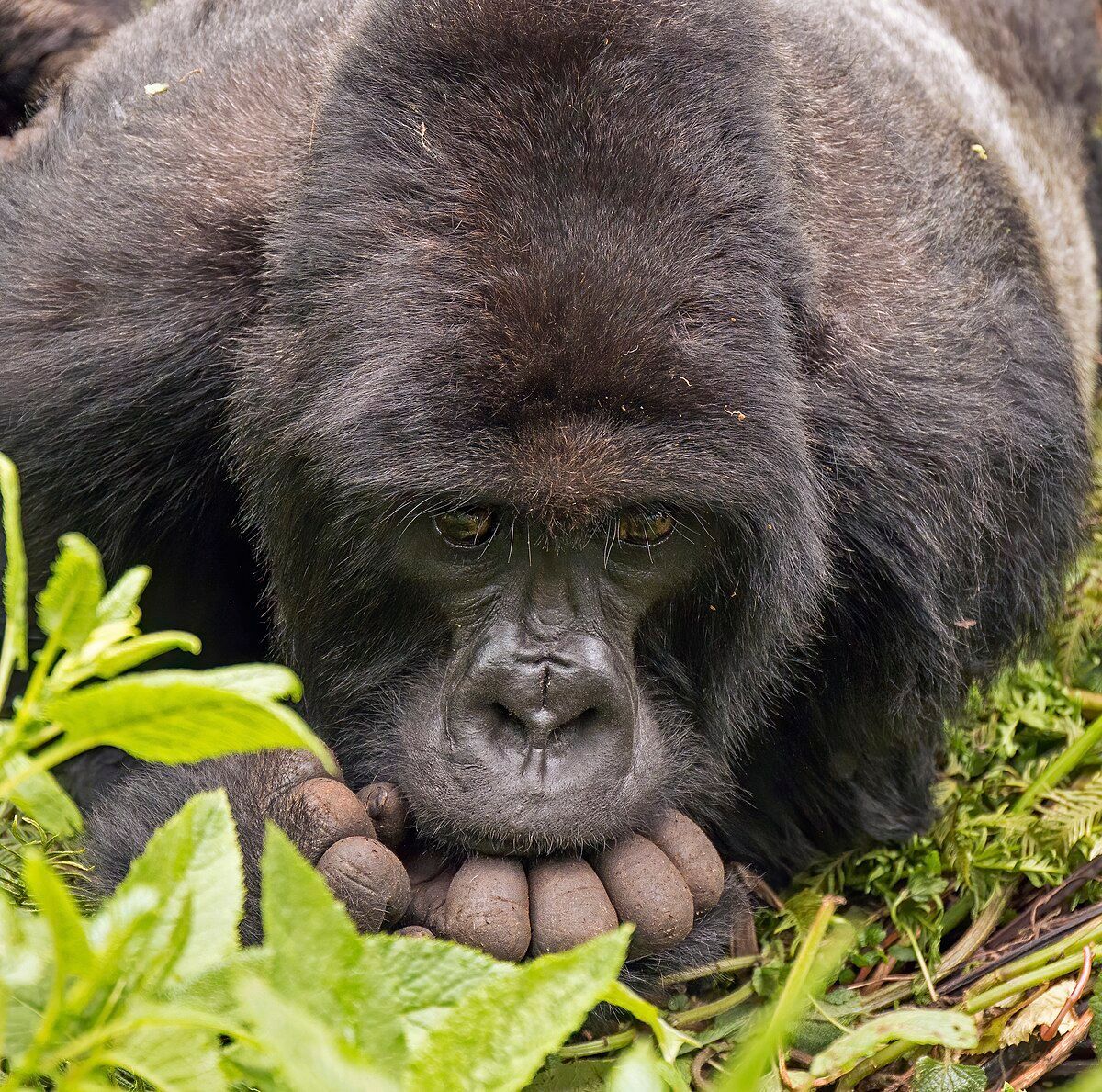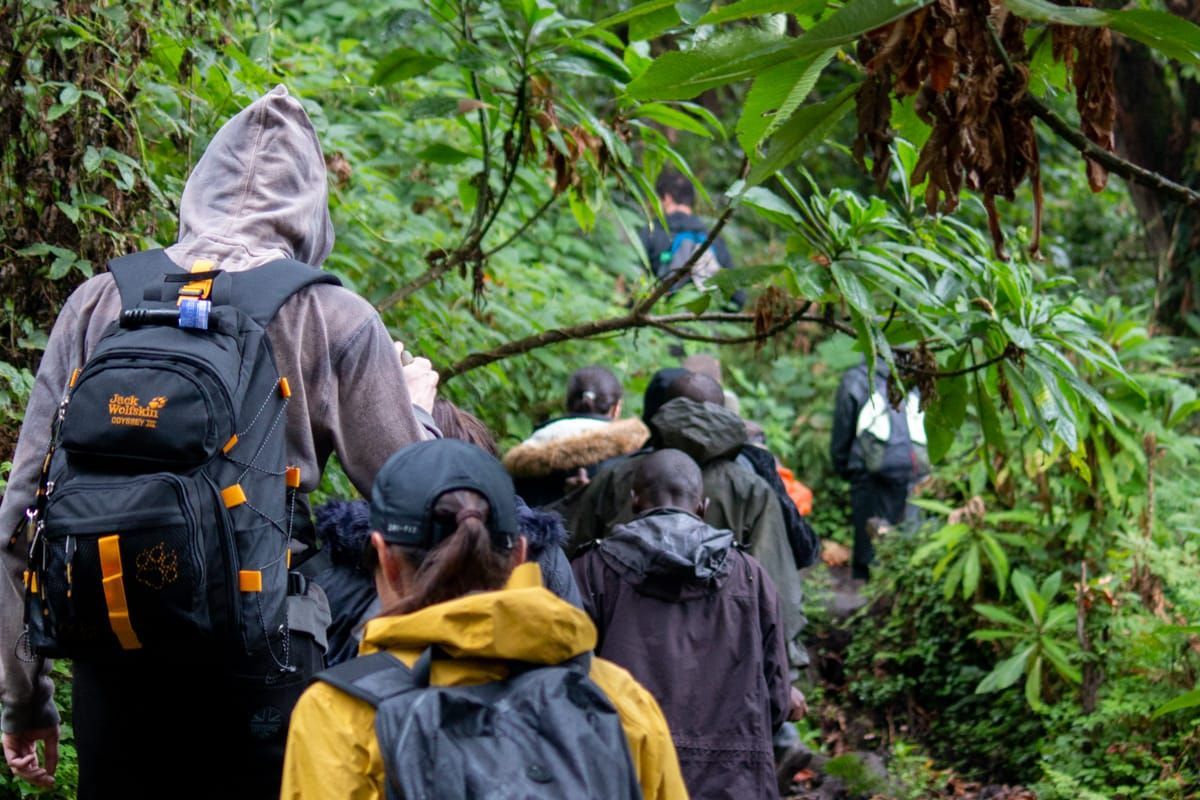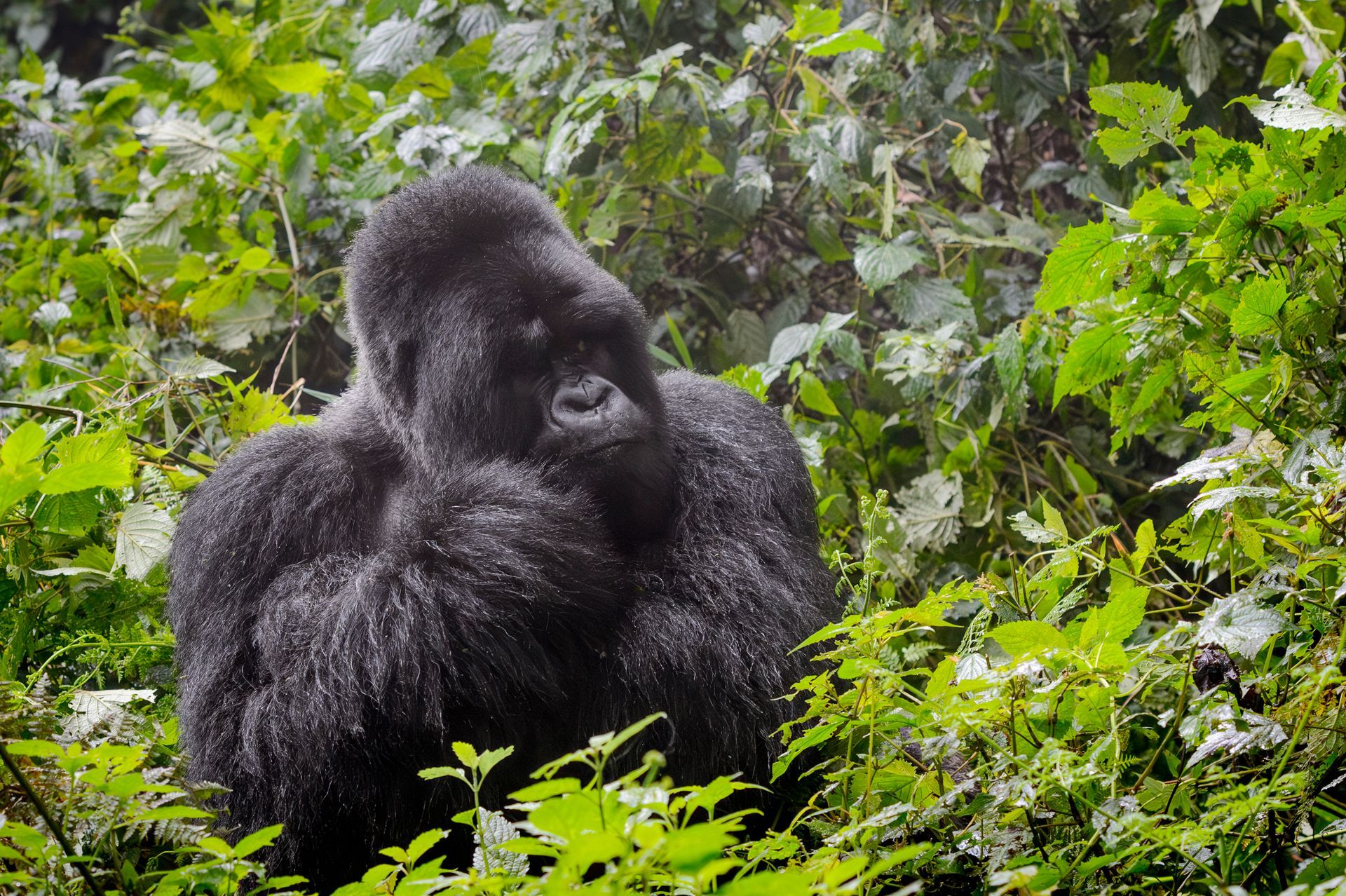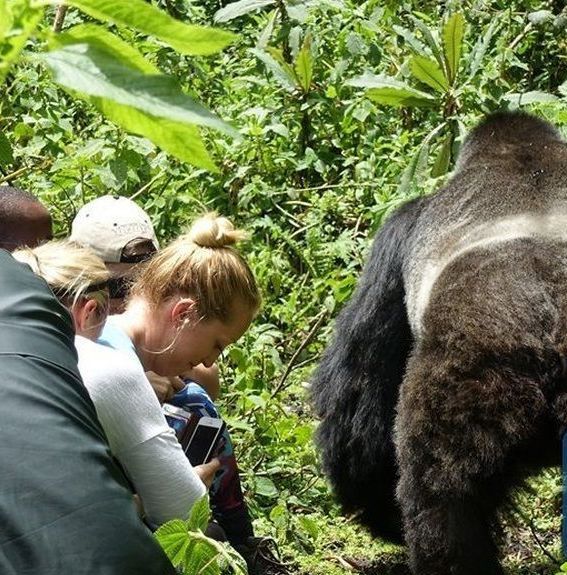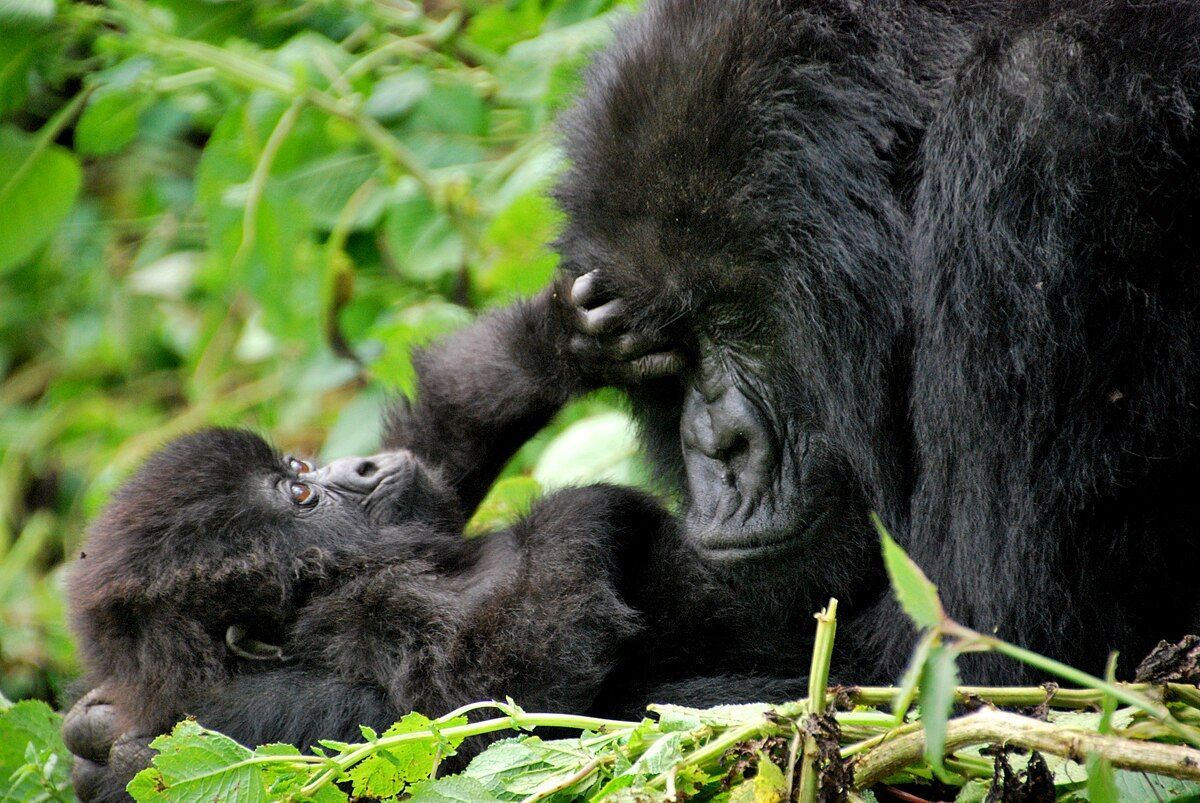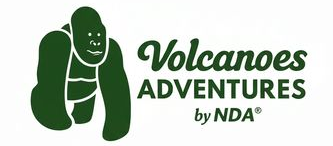Gorilla Trekking Rwanda | Volcanoes National Park Guide
Gorilla trekking in Rwanda's Volcanoes National Park offers the world's premier mountain gorilla experience. With 11 habituated gorilla families, expert guides, and permits from $1,500, Rwanda gorilla trekking combines accessibility, safety, and unforgettable wildlife encounters just 2 hours from Kigali.
Low season discounts reduce permits to $1,050 (November-May), making Rwanda gorilla trekking more accessible while supporting critical conservation efforts. Your trek directly funds gorilla protection, anti-poaching patrols, and community development in one of conservation's greatest success stories.
Gorilla Trekking Rwanda at a Glance
- Location: Volcanoes National Park, Northern Province, Rwanda
- Distance from Kigali: 2 hours (116km)
- Gorilla Families: 11 habituated groups
- Permit Cost: $1,500 USD (standard), $1,050 USD (low season)
- Duration: 1-6 hours trekking, 1 hour with gorillas
- Group Size: Maximum 8 trekkers per group
- Daily Permits: 96 available (8 per family)
- Success Rate: 100%+
- Minimum Age: 15 years
- Best Time: Year-round; dry season (June-September) ideal
Why Choose Rwanda for Gorilla Trekking?
Accessibility from Kigali
Rwanda gorilla trekking stands out for its unmatched accessibility. Volcanoes National Park is only two hours from Kigali International Airport, compared to Uganda's 8-10 hour drive or Congo's challenging access. This means you can fly into Kigali in the morning and be trekking mountain gorillas the next day.
World-Class Infrastructure
Rwanda has invested heavily in tourism infrastructure. Volcanoes National Park features well-maintained trails, professional park headquarters, excellent accommodations ranging from luxury lodges to budget guesthouses, and the most organized gorilla trekking operations in Africa.
Expert Guides and Trackers
Rwanda's park rangers and guides are among the best-trained in the world. Many have decades of experience tracking specific gorilla families. Their knowledge of gorilla behavior, forest ecology, and safety protocols ensures exceptional experiences while protecting both visitors and gorillas.
Higher Success Rate
With a 100%+ success rate of encountering gorillas, Rwanda gorilla trekking delivers on its promise. Dedicated trackers locate gorilla families before your trek begins, ensuring you spend time observing gorillas rather than searching for them.
Conservation Leadership
Rwanda has pioneered gorilla conservation through community-based tourism. Revenue from gorilla trekking permits funds anti-poaching efforts, habitat protection, and community development. The mountain gorilla population has grown from approximately 250 in the 1980s to over 1,000 today—a remarkable conservation success story.
Low Season Discount
Rwanda offers a 30% permit discount during the low season (November to May), reducing costs from $1,500 to $1,050. This requires staying two nights in either Nyungwe National Park or Akagera National Park, creating an excellent multi-park safari experience.
Safety and Stability
Rwanda is one of Africa's safest countries for tourists. The country's commitment to cleanliness, security, and hospitality creates a comfortable environment for travelers. Political stability and low crime rates make Rwanda gorilla trekking worry-free.
The 11 Gorilla Families of Volcanoes National Park
Each of Volcanoes National Park's 11 habituated gorilla families has unique characteristics, personalities, and histories. Park rangers assign groups based on your fitness level and interests.
Susa Family (Susa A)
- Silverback: Kurira
- Members: 28 (largest group)
- Difficulty: Challenging
- Special Feature: Famous Poppy (born in 2007) and multiple twin births
- Trek Duration: 3-6 hours
- Location: Higher elevations
The legendary Susa family was studied by Dian Fossey and remains one of Rwanda's most sought-after gorilla groups. Known for producing twins—rare in mountain gorillas—the Susa family offers incredible photographic opportunities but requires good fitness due to challenging terrain.
Karisimbi Group
- Silverback: Multiple
- Members: 10+
- Difficulty: Very Challenging
- Special Feature: Named after Mount Karisimbi
- Trek Duration: 4-7 hours
- Location: Slopes of Mount Karisimbi
This group often ranges high on the slopes of Rwanda's tallest mountain. The challenging trek rewards determined visitors with spectacular mountain scenery and a more adventurous gorilla encounter.
Sabyinyo Family
- Silverback: Guhonda
- Members: 8-10
- Difficulty: Moderate
- Special Feature: Guhonda is the largest silverback (220kg)
- Trek Duration: 2-4 hours
- Location: Base of Mount Sabyinyo
Named after the "Old Man's Teeth" volcano, the Sabyinyo family is led by Guhonda, the largest known mountain gorilla silverback. His impressive size and gentle nature make encounters with this family unforgettable.
Amahoro Family
- Silverback: Ubumwe
- Members: 17
- Difficulty: Moderate to Challenging
- Special Feature: "Peace" family (amahoro means peace)
- Trek Duration: 2-5 hours
- Location: Mid-altitude forest
True to its name, the Amahoro family is known for its calm, peaceful demeanor. Led by silverback Ubumwe after the death of gentle giant Ubumwe, this family offers relaxed observation opportunities.
Umubano Group
- Silverback: Charles
- Members: 11
- Difficulty: Moderate
- Special Feature: Split from Amahoro in 2008
- Trek Duration: 2-4 hours
- Location: Near Amahoro territory
Umubano ("neighbor" in Kinyarwanda) formed when silverback Charles left the Amahoro family with several females. This family demonstrates fascinating gorilla social dynamics and leadership transitions.
Hirwa Family
- Silverback: Munyinya (deceased), now multiple
- Members: 16
- Difficulty: Moderate
- Special Feature: "Lucky" family, formed in 2006
- Trek Duration: 2-4 hours
- Location: Variable
Hirwa means "lucky" in Kinyarwanda. This group has experienced significant growth and is known for playful juveniles and active youngsters, making it particularly entertaining for photographers.
Agashya Group (Group 13)
- Silverback: Agashya
- Members: 25+
- Difficulty: Moderate
- Special Feature: Dramatic leadership takeover story
- Trek Duration: 2-4 hours
- Location: Lower elevations, often accessible
Originally led by silverback Nyakarima, this group's leadership was taken over by the younger Agashya in a dramatic fashion. Now one of the largest families, Agashya group offers excellent viewing opportunities with easier access.
Kwitonda Family
- Silverback: Kwitonda
- Members: 18
- Difficulty: Challenging
- Special Feature: Migrated from Congo in 2003
- Trek Duration: 3-6 hours
- Location: Higher elevations
This family crossed from the Democratic Republic of Congo into Rwanda in 2003. Named after the dominant silverback, Kwitonda group demonstrates how mountain gorillas move across borders, highlighting the importance of transboundary conservation.
Bwenge Family
- Silverback: Bwenge
- Members: 11
- Difficulty: Challenging
- Special Feature: "Wisdom" family, led by lone silverback since 2007
- Trek Duration: 3-5 hours
- Location: Variable, often higher elevations
Bwenge means "wisdom," fitting for a silverback who successfully led his family alone for years. After other males died, Bwenge protected and grew his family, demonstrating remarkable leadership.
Ugenda Family
- Silverback: Kagabo
- Members: 11
- Difficulty: Very Challenging
- Special Feature: "Mobile" family that ranges widely
- Trek Duration: 4-7 hours
- Location: Highly variable
Ugenda means "on the move," perfectly describing this nomadic family. They cover large territories, making treks longer and more unpredictable. For adventurous trekkers seeking a true expedition experience, Ugenda delivers.
Muhoza Family
- Silverback: Ubumwe II (son of original Ubumwe)
- Members: 10+
- Difficulty: Moderate
- Special Feature: Newest habituated family (opened 2021)
- Trek Duration: 2-4 hours
- Location: Accessible areas
Muhoza is one of the newest families opened for tourism. Named after a sector in Musanze district, this group represents Rwanda's commitment to expanding sustainable gorilla tourism while maintaining conservation standards.
What to Expect: Your Gorilla Trekking Experience
Pre-Trek: Park Headquarters Briefing (7:00-8:00 AM)
Your Rwanda gorilla trekking experience begins at Volcanoes National Park headquarters in Kinigi. Arrive by 7:00 AM for check-in, permit verification, and pre-trek briefing.
At the briefing, you'll:
- Learn gorilla viewing etiquette and safety rules
- Be assigned to one of the 11 gorilla families based on fitness level and preferences
- Meet your ranger guide and fellow trekkers (maximum 8 per group)
- Have the option to hire porters ($15-20) to carry your daypack
- Enjoy traditional Rwandan coffee and entertainment
Important: If you're feeling ill, inform rangers immediately. Gorillas share 98% of our DNA and are vulnerable to human diseases. Sick visitors won't be permitted to trek, but permits can sometimes be rescheduled.
The Trek: Through Mountain Rainforest (1-6 Hours)
Trek duration varies dramatically depending on which gorilla family you're assigned and where they spent the previous night. Some families may be 30 minutes from the trailhead; others require 4-5 hours of hiking.
What the trek involves:
- Hiking through agricultural land before entering the park boundary
- Trekking through dense bamboo forests, hagenia woodlands, and open areas
- Navigating muddy, sometimes steep terrain (gaiters and hiking poles essential)
- Following trackers who located the gorilla family earlier that morning
- Potentially encountering other wildlife: golden monkeys, forest elephants, duikers, birds
Terrain challenges:
- Elevation: 2,500-3,500 meters (altitude may cause breathlessness)
- Steep slopes with roots, rocks, and thick vegetation
- Often muddy and slippery, especially during wet season
- Stinging nettles present (wear long sleeves and pants)
- Weather can change rapidly (rain possible any time)
Fitness requirements: You don't need to be an athlete, but reasonable fitness helps. The trek involves continuous uphill hiking, often on uneven, muddy trails. Most people in moderate health complete treks successfully. Listen to your body, communicate with guides, and take breaks as needed.
Porters: Hiring a porter ($15-20) is highly recommended. Porters carry your daypack, help you navigate difficult sections, and provide support when terrain gets challenging. Porter fees directly benefit local communities, making it a meaningful contribution beyond just personal assistance.
The Encounter: One Hour with Mountain Gorillas
When trackers locate your assigned gorilla family, rangers will ask you to leave backpacks behind (porters guard them) and approach quietly in single file.
Your hour with gorillas includes:
Observing Natural Behaviors: Watch mountain gorillas feed on bamboo shoots, leaves, and vegetation. See juveniles playing, infants clinging to mothers, and silverbacks resting majestically. Gorillas are surprisingly tolerant of human presence after habituation, often ignoring visitors entirely or displaying mild curiosity.
Incredible Proximity: You'll maintain a 7-meter distance, but gorillas don't always respect this boundary! It's not uncommon for curious juveniles or moving adults to come closer. If a gorilla approaches, remain calm, crouch down, and avoid direct eye contact.
Photography Opportunities: No flash photography is allowed, so bring cameras with good low-light performance. The forest canopy creates challenging lighting, but the intimate distance and lack of vehicle barriers make for spectacular, unobstructed photos.
Emotional Connection: Many visitors describe gorilla trekking as the most moving wildlife experience of their lives. The eye contact, human-like expressions, and gentle family interactions create profound connections. Don't be surprised if you're moved to tears.
Strict Rules During the Hour:
- Keep voices low
- No eating or drinking
- No touching gorillas (even if they touch you)
- No flash photography
- Turn away and cover your mouth if you cough or sneeze
- Move slowly and deliberately
- Follow all ranger instructions immediately
After the Encounter: Return Trek (1-3 Hours)
After your precious hour ends, rangers lead you back to the trailhead. The return journey is usually quicker as it's mostly downhill, but can still be slippery and challenging.
At the trailhead:
- Receive your gorilla trekking certificate
- Optional: Purchase souvenirs from craft stalls
- Share experiences with fellow trekkers
- Return to your lodge for well-deserved rest
Most visitors spend the afternoon relaxing, processing the incredible experience, and reviewing photos. Many describe feeling emotionally exhausted in the best possible way.
Rwanda Gorilla Trekking Permits: Prices & How to Book
Permit Prices
Standard Gorilla Permit: $1,500 USD per person
- Valid for one gorilla trek
- One hour with gorillas
- Park entrance fees included
- Ranger guide and armed escort included
- Available year-round
Low Season Discount: $1,050 USD per person (30% savings)
- Available November 1 - May 31
- Requires 2-night minimum stay in Nyungwe National Park OR Akagera National Park
- Must be booked as a package
- Same experience as standard permit
- Excellent value for multi-park safaris
What's Included in the Discount Package
Your 4 Days Rwanda gorilla safari covers:
- Park entrance fees to Volcanoes and Akagera National Park
- One hour with your assigned gorilla family
- Expert park ranger guide
- Armed security escort (protection from wildlife, not security threats)
- Support from gorilla trackers who locate families in advance
- Transport to/from Kigali
- Accommodation
- Meals
- Porter services ($15-20, highly recommended)
- Tips for guides and porters
- Personal gear and equipment
- Travel insurance
Timeline: Book in advance, permits are limited and sell out quickly.
Permit Allocation: Permits are assigned to specific dates and gorilla families. While you can request a particular family (Susa, Sabyinyo, etc.), final assignment depends on availability and your fitness level assessed at the morning briefing.
Cancellation & Rescheduling
Permit Cancellations:
- Gorilla permits are generally non-refundable once issued. During check out you can select Enhanced Cancellation Terms for an additional 8% of total costs that allows you to get a full refund if you choose to cancel.
- We may allow rescheduling in exceptional circumstances (illness, emergency)
- Rescheduling is subject to availability
- Travel insurance covering trip cancellations is essential
Weather Cancellations: Gorilla trekking proceeds in rain—it's a rainforest! Only severe, dangerous weather (rare) results in cancellations. If the park closes due to extreme conditions, permits may be rescheduled.
Best Time for Gorilla Trekking in Rwanda
Mountain gorilla trekking in Rwanda is available year-round, but weather patterns affect trekking conditions and experience quality.
Dry Season (Best Overall) - June to September
Weather:
- Less rainfall, though rain still possible
- Drier trails (though still muddy in places)
- Clearer skies for mountain views
- Warmer daytime temperatures (15-20°C)
Advantages:
- Easier trekking on less muddy trails
- Better photography lighting conditions
- More comfortable hiking
- Pleasant weather at lodges
Disadvantages:
- Peak tourist season (higher demand)
- Permits sell out 6+ months in advance
- More trekking groups in the park
- Higher accommodation prices
- More dust on trails
Best for: First-time trekkers, those with moderate fitness, photographers seeking optimal lighting
Short Dry Season - December to February
Weather:
- Relatively dry with occasional rain
- Cool temperatures (10-15°C)
- Mist common in mornings
- Good visibility most days
Advantages:
- Good trekking conditions
- Festive holiday atmosphere
- Permits available but book early
- Beautiful green landscapes from previous rains
Disadvantages:
- Popular holiday period (higher prices)
- Colder temperatures, especially at altitude
- Can be foggy limiting visibility
Best for: Holiday travelers, those avoiding extreme wet season, visitors wanting green scenery with decent weather
Long Wet Season (Low Season) - March to May
Weather:
- Heaviest rainfall period
- Very muddy, slippery trails
- Frequent afternoon downpours
- Cooler temperatures (12-17°C)
- Fog and mist common
Advantages:
- 30% permit discount ($1,050 instead of $1,500)
- Fewer tourists, more solitude
- Lower accommodation rates
- Lush, vibrant vegetation
- Great for photographers who don't mind rain
- Better availability, easier booking
Disadvantages:
- Very muddy, challenging trails
- Rain can make trekking difficult
- Photography lighting more challenging
- Need excellent rain gear
- Leeches more common
Best for: Budget-conscious travelers, experienced hikers comfortable with mud, those seeking solitude, adventure travelers
Short Wet Season - October to November
Weather:
- Moderate rainfall
- Less intense than March-May rains
- Warm temperatures (15-20°C)
- Afternoon showers common
Advantages:
- 30% low season discount
- Beautiful scenery as landscape greens
- Fewer crowds than peak season
- Baby gorillas often born this time
- Good availability
Disadvantages:
- Muddy trails
- Rain gear essential
- Less predictable weather
Best for: Shoulder season travelers, those wanting discount without extreme wet season conditions
Year-Round Considerations
Mountain Weather is Unpredictable: Even in dry season, rain can occur. Even in wet season, you may have sunny days. Always prepare for rain regardless of when you visit.
Gorilla Behavior: Gorillas don't migrate seasonally. All 11 families are accessible year-round. Seasonal factors affect trekking difficulty, not gorilla presence.
Our Recommendation: If possible, visit during dry season (June-September) for easiest trekking. If budget is a concern, embrace wet season (November-May) for 30% savings—just prepare for muddy conditions and bring excellent rain gear.
What to Bring: Essential Gorilla Trekking Gear
Clothing
Must-Have:
- Waterproof hiking boots (broken in, ankle support essential)
- Gaiters (protects from mud, stinging nettles, ants)
- Long pants (not shorts—protects from vegetation)
- Long-sleeve shirt (lightweight, moisture-wicking)
- Waterproof rain jacket (rain likely any time of year)
- Waterproof pants or rain cover
- Garden gloves (for grabbing vegetation when climbing)
- Warm fleece or jacket (mornings are cold at altitude)
- Hat with brim (sun and rain protection)
- Warm hat for early morning
Recommended:
- Moisture-wicking base layers
- Extra pair of socks
- Lightweight scarf or buff
- Compression sleeves for knees
Avoid:
- Bright colors (earth tones preferred)
- Perfume or strong scents
- Camouflage patterns (illegal in Rwanda)
- Jewelry that can catch on vegetation
Footwear & Accessories
Footwear:
- Waterproof hiking boots (most important item!)
- Good tread for mud
- Ankle support essential
- Broken in before trip
- Gaiters highly recommended
Walking Aids:
- Walking poles (can rent at park, but bring your own)
- Knee braces if prone to knee pain
Equipment & Gear
Essential:
- Daypack (20-30L, comfortable for 6 hours)
- 2-3 liters water (hydration critical at altitude)
- High-energy snacks (trail mix, energy bars, chocolate)
- Packed lunch (provided by lodge)
- Camera with good low-light capability (no flash!)
- Extra camera batteries (cold drains batteries fast)
- Plastic bags to protect electronics from rain
- Small first aid kit
- Insect repellent (DEET-based)
- Sunscreen (SPF 30+)
- Hand sanitizer
- Toilet paper and trowel (no facilities on trail)
Highly Recommended:
- Porter ($15-20 to carry your pack—worth every dollar)
- Rain cover for backpack
- Binoculars (for birds and distant gorilla viewing)
- Notebook and pen
- Small towel
Optional:
- GoPro or action camera (for video)
- Trekking gaiters (in addition to mud gaiters)
- Whistle (emergency signal)
- Headlamp (if return trek runs late)
Prohibited Items
Do NOT bring:
- Flash cameras or lights
- Drones
- Food that will be eaten near gorillas
- Smoking materials
- Large bags or backpacks
Health, Safety & Requirements
Age Requirements
Minimum Age: 15 years old (strictly enforced)
Gorilla trekking involves strenuous hiking and potential health risks to gorillas from younger immune systems. IDs will be checked at park headquarters. No exceptions.
Maximum Age: No official limit, but assess your fitness honestly. Trekkers in their 70s and 80s have successfully completed treks with proper preparation and porter support.
Fitness Requirements
What's Required:
- Ability to hike 1-6 hours on steep, muddy, uneven terrain
- Moderate cardiovascular fitness
- Reasonable mobility and balance
- Ability to navigate obstacles (fallen trees, muddy sections, streams)
- No severe joint problems (knees, ankles, hips)
Fitness Level by Gorilla Family: Rangers assign families based on fitness assessment at morning briefing:
- Easier families: Sabyinyo, Amahoro, Agashya (2-4 hour treks)
- Moderate families: Hirwa, Umubano, Muhoza (3-5 hour treks)
- Challenging families: Susa, Kwitonda, Bwenge (4-6+ hour treks)
If You're Concerned About Fitness:
- Request an easier family at booking
- Hire a porter (or two!) for assistance
- Train before your trip (walk hills with a daypack)
- Use trekking poles
- Be honest at the morning briefing
Health Requirements
Mandatory Vaccinations:
- Yellow Fever (certificate required for entry to Rwanda)
Recommended Vaccinations:
- Hepatitis A and B
- Typhoid
- Tetanus
- Measles, Mumps, Rubella (MMR)
- COVID-19 (check current requirements)
Malaria: Volcanoes National Park is at high altitude (2,500-4,000m) where malaria is rare. However, Kigali and lower areas have malaria risk. Consult your doctor about prophylaxis.
Altitude Considerations:
- Park altitude: 2,500-3,500 meters
- Mild altitude sickness symptoms possible (headache, breathlessness)
- Usually mild and manageable
- Stay hydrated and ascend slowly
- Inform guides if symptoms worsen
When You CANNOT Trek
You will not be permitted to trek if you:
- Have a cold, flu, cough, or any contagious illness
- Show signs of illness (even if you feel okay)
- Have open wounds or infections
- Are vomiting or have diarrhea
Why this matters: Gorillas share 98% of our DNA and are highly susceptible to human diseases. A common cold can be fatal to gorillas. If you're sick on trek day, inform rangers immediately. They may allow permit rescheduling if you have proof of illness and availability permits.
Travel Insurance: Get comprehensive coverage including trip cancellation, medical evacuation, and gorilla permit rescheduling due to illness.
Safety During the Trek
Wildlife Safety: Armed rangers accompany all treks to protect from wildlife (buffalo, elephants, rarely leopards). Follow ranger instructions immediately.
Gorilla Behavior Safety:
If a gorilla charges:
- DO NOT RUN (triggers chase instinct)
- Crouch down submissively
- Look at the ground (avoid eye contact)
- Stay still and calm
- Wait for the gorilla to pass or lose interest
If a gorilla approaches:
- Remain calm and still
- Crouch down
- Avoid direct eye contact
- Let it pass by
- Don't touch (even if gorilla touches you)
If a gorilla vocalizes or beats chest:
- It's usually display behavior, not aggression
- Stay calm and still
- Follow ranger guidance
Trail Safety:
- Stay with your group
- Follow the ranger's pace
- Communicate if you need breaks
- Use your porter for support
- Watch for slippery sections
- Stay hydrated
Emergency Procedures
Rangers carry:
- First aid equipment
- Communication devices
- Emergency evacuation protocols
Emergency Evacuation Insurance: Rwanda requires $50 Akagera Emergency Air Evacuation insurance covering your entire stay. This ensures rapid helicopter evacuation if needed for serious medical emergencies.
Gorilla Trekking Etiquette & Rules
Before You Trek
- Arrive at park headquarters by 7:00 AM
- Use the restroom before departing (no facilities on trail)
- Leave valuables at lodge
- Wear earth-toned clothing
- Apply sunscreen and insect repellent before entering forest
During the Trek
Respect the Forest:
- Stay on designated trails
- Don't litter (carry all trash back)
- Don't pick plants or flowers
- Minimize noise
- Follow "leave no trace" principles
Following Your Guide:
- Ranger guides make all decisions
- Don't rush ahead or lag behind
- If you need breaks, communicate
- Listen to all safety instructions
With the Gorillas (Critical Rules)
Mandatory Requirements:
- Keep 7 meters (23 feet) distanceGorillas may come closer (that's okay)
- You must maintain distance
- If gorilla approaches, stay still and crouch
- No flash photographyFlash disturbs gorillas and damages their eyes
- Use cameras with good low-light performance
- Natural light photography only
- Keep voices lowWhisper if you must speak
- Let gorilla vocalizations be heard
- Minimize human noise
- No eating or drinkingNothing near gorillas
- Germs from food dangerous to gorillas
- Water allowed at designated breaks only
- No touchingEven if gorilla touches you, don't touch back
- Maintain boundaries for gorilla health
- Disease transmission risk
- Turn away if you cough/sneezeCover your mouth
- Face away from gorillas
- Human respiratory infections can kill gorillas
- Maximum 1 hourStrictly enforced
- Minimizes gorilla stress
- Allows multiple groups to visit daily
- No sudden movementsMove slowly and deliberately
- Don't point or make gestures
- Remain calm and peaceful
- Stay together as a groupDon't wander off alone
- Follow ranger positioning
- Move as a unit
- Follow ALL ranger instructions immediatelyRangers know gorilla behavior
- Instant obedience can prevent dangerous situations
- Your safety and gorillas' safety depend on compliance
If You Need to Use the Toilet
Tell your ranger guide. They'll instruct you to:
- Move at least 100 meters from gorillas
- Dig a hole 30cm deep
- Cover completely when finished
- Use toilet paper sparingly (carry back if possible)
After the Encounter
- Thank your guides and trackers
- Dispose of all trash properly
- Share your experience responsibly on social media (encourage conservation)
- Leave honest reviews to help future trekkers
Combining Gorilla Trekking with Other Rwanda Activities
Multi-Day Gorilla Trekking Packages
2-Day Gorilla Experience
- Day 1: Travel to Volcanoes NP, evening at leisure
- Day 2: Gorilla trekking, return to Kigali
- Best for: Short visits, single trek experience
3-Day Gorillas & Golden Monkeys
- Day 1: Travel to Volcanoes NP
- Day 2: Gorilla trekking
- Day 3: Golden monkey tracking, return to Kigali
- Best for: Wildlife enthusiasts wanting both primates
4-Day Double Gorilla Trek
- Day 1: Travel to Volcanoes NP
- Day 2: First gorilla trek
- Day 3: Second gorilla trek (different family)
- Day 4: Return to Kigali or extend
- Best for: Serious gorilla enthusiasts
Gorilla Trekking + Volcano Hiking
3-Day Gorillas & Volcano Combo
- Day 1: Gorilla trekking
- Day 2: Rest or cultural activities
- Day 3: Mount Bisoke crater lake hike
- Best for: Active travelers
5-Day Gorillas & Karisimbi Summit
- Day 1: Arrive Volcanoes NP
- Day 2: Gorilla trekking
- Day 3-4: Mount Karisimbi 2-day summit trek
- Day 5: Depart or extend
- Best for: Adventure seekers
Low Season Multi-Park Packages
Take advantage of 30% gorilla permit discount (November-May) by combining parks:
Gorillas, Chimps & Big Game (7 Days)
- Days 1-2: Nyungwe Forest (chimpanzee tracking, canopy walk)
- Days 3-4: Volcanoes NP (gorilla trekking)
- Days 5-6: Akagera NP (Big Five safari)
- Day 7: Return to Kigali
- Discount: $1,050 gorilla permits (save $450)
Complete Rwanda Safari (10 Days)
- Kigali city tour
- Akagera National Park (2 nights)
- Volcanoes NP gorilla trekking (3 nights)
- Nyungwe Forest chimpanzee trekking (2 nights)
- Lake Kivu relaxation (2 nights)
- Best value: Low season discount, comprehensive experience
Cultural Additions
Iby'Iwacu Cultural Village (Gorilla Guardians)
- Traditional Rwandan village experience
- Learn about pre-colonial culture
- Traditional dance performances
- Former poacher rehabilitation project
- Half-day activity
Dian Fossey Tomb Hike
- Trek to Karisoke Research Center
- Visit Fossey's grave and gorilla cemetery
- Learn conservation history
- 4-6 hour hike
- Moderate difficulty
- Permits: $75
Genocide Memorial Sites
- Kigali Genocide Memorial
- Understanding Rwanda's history and reconciliation
- Important context for visiting Rwanda
- Half-day in Kigali
Relaxation & Extension Options
Lake Kivu
- Scenic lake on DRC border
- Beach relaxation
- Water sports (kayaking, stand-up paddleboarding)
- Island tours
- Coffee plantation tours
- 3-hour drive from Volcanoes NP
Kigali City
- Clean, safe, modern capital
- Excellent restaurants and cafes
- Shopping for crafts and souvenirs
- Museums and galleries
Hotel variety from budget to luxury
